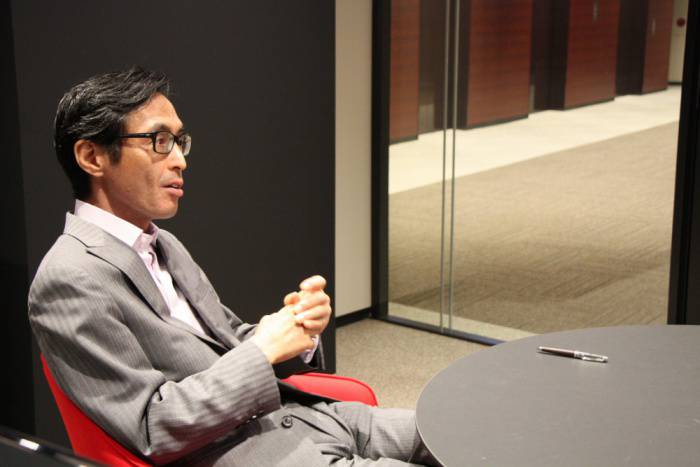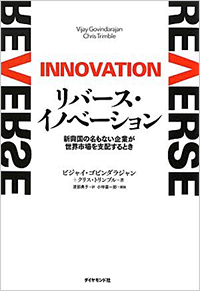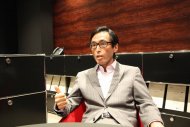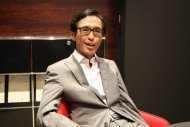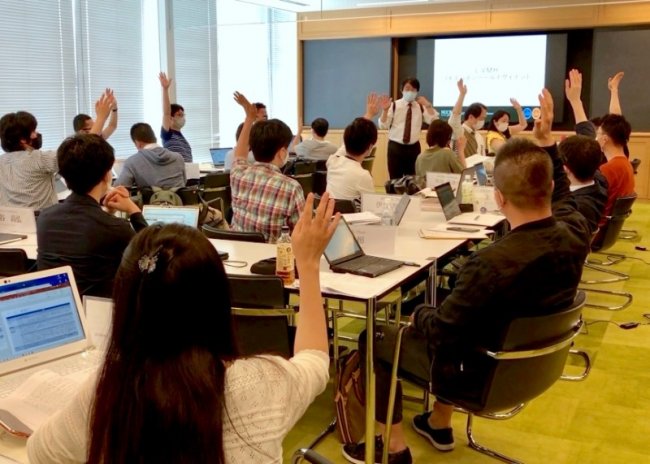Dr. Seiichiro Iwasawa, Professor, Graduate School of Management
Professor Iwasawa, who specializes in behavioral economics, is a practitioner who has worked as an analyst and strategist at Nomura Research Institute and Nomura Securities. Dr. Iwasawa, who is popular among students for his light-hearted talk, talked to us about what makes discussions interesting.
Interviewed: September 2015
Interviewed by: NUCB Business School Public Relations
Japanese are hardworking but have low work engagement.
Communication skills with subordinates is a must for anyone who is going to get an MBA.
This is the theme of work-engagement. For example, if you are blank, you are not engaged in this conversation. For example, if you're blank, you're not engaged in this conversation, but if you're drawn in by what I'm saying, you're engaged.
When you look back at your work, there are times when you are enthusiastic about it and times when you are not. If you look back at your daily life and see that you are enthusiastic most of the time, you are a person with high work-engagement. This is actually the subject of the fourth (and final) day of my behavioral economics class. This is actually the subject of the fourth (and final) day of the behavioral economics class, where we use work engagement as a starting point for discussion. For example, data from various surveys shows that Japanese companies are among the lowest in the world when compared to companies around the world in terms of employee work engagement.
I used to think the Japanese were diligent.
Yes, that's what you think, isn't it? However, it is important to note that diligence and engagement are somewhat different concepts. In diligence, the body is working hard, but the mind may not be moving. On the other hand, work engagement means that you are enjoying your work from the bottom of your heart. From this point of view, Japanese people's work engagement is the lowest in the world. A survey using the "job satisfaction" scale yields the same result. Even though Japanese people are somewhat dissatisfied with their jobs, they do their best because they are in this profession.
The difference in students' work engagement makes the discussion more interesting.
Is there such a thing as national character?
There is also something like national character. But it's also clear that it's not just that. For example, many of the people who come to the Business School actually have a high level of work-engagement. But interestingly, if you look at the statistics, there are two mountains within a class. About half of the class is happy to be working. On the other hand, the other half of the class comes to business school because they are a little stuck in their career or work and want to change their life.
So, these two groups of people make for really good discussions. In the class, after the whole class discussion, we split up into groups and have them discuss what they can do to improve their own work engagement, and if you are the boss, what you can do to improve the work engagement of your subordinates. When we do this, the fourth day is very exciting. The fourth day is very exciting, and everyone is in a very good mood. And I do a lot of research on the students there (laughs), and I use the results to write my paper.
So you don't take the stance of "I only want to do research, I have no choice but to teach."
In that sense, my idea is different. The class time is a very valuable field survey opportunity for me, and I feel very grateful to be given such an opportunity. So when I'm in class, the students are supposed to be learning, but I'm also watching them intently. I'm trying to watch them intently, I guess you could say.
Do you have any ideas for your classes?
It's a business school. Professor Nagasawa always says that teachers should not teach in business school classes. In my case, I am not as enlightened as Prof. Nagasawa, but I still try to spend as much time as possible on discussions. Then, I have to think about how to facilitate the discussion. I have to think carefully about how to lead the discussion. You need to think carefully about how you want to lead the discussion, how you want to ask questions, and how you want to interject. I try to think about these points before the class.
The students' level of understanding will increase several levels.
Do you have to simulate it before you go to the lecture?
![リバース・イノベーション]()
That's right. Well, it's not uncommon for a discussion to take a turn in a direction that I hadn't expected. That's what makes it more interesting. I also teach several courses, but for Japanese students, I am in charge of the EMBA course "Behavioral Economics," which cultivates logical thinking skills, and the MBA course "Economy in Emerging Markets," which creates new value. This is also a very interesting class to teach.
One of the themes of the class, "Economy in Emerging Markets," is about reverse innovation. When you think of reverse innovation, you think of developing technology in developed countries and then bringing it to emerging countries, but in reality, when you bring it to the emerging markets, the technology developed in the developed countries doesn't work at all. But in reality, when you take the technology to the emerging markets, the technology developed in the developed countries may not work at all, so you need a fundamental innovation from the emerging countries, and the developed technology may flow back to the developed countries. So, we learn about eight cases of reverse innovation, and in the course of time, it's like a chemical reaction, but your understanding goes up several levels.
For example, if you are in a sports club and the majority of the members are players from a famous high school, and there are players from a weaker high school, how do you think they will react? For example, in a sports club, the majority of the members are players from famous high schools, but there are players from weak high schools. If you can't win without nurturing these players, the problem of how to nurture these players is related to the problem of reverse innovation," and so on. In the end, everyone's understanding gradually grew to the point where it could be applied to many aspects of life, even beyond corporate management.
The catalyst for this is the presentation on reverse innovation. I ask each person to read the case and present whatever case study they can think of using the term "reverse innovation. Then, everyone comes up with all kinds of things to say. I was inspired by that, and my thinking was stimulated to think in that way. It was like a ball-and-chain situation, and all kinds of ideas came out. It's fun to watch this transformation. It's really fun to see how everyone is stimulated and says what they want. Furthermore, if you think about it, it is very much related to the fundamental theme of the research I'm doing. For example, I think it is deeply related to the topic of work-engagement. When I see people enjoying their classes in the classroom, it inspires me, and I feel happy just watching them.
Don't go to class with a dirty mind to create a positive atmosphere in the classroom.
Does the teacher talk and listen in a way that encourages opinions?
The point is to respond to whatever the students say in a positive atmosphere. It's not that difficult. Even if you think their opinion is a little strange, you can say, "That's interesting."
Am I allowed to write this?
Don't worry, even when it's really funny, I'll say, "That's funny!" when it's really interesting. When teaching, I think teachers need to think carefully about how to facilitate the discussion, and how to get opinions from everyone. On top of that, since thinking doesn't get you what you want, you need to have a quick intuition, but you have to value each and every way you react. One important thing is to not go to class with a dirty mind. If you go to class with a dirty mind, the students will inevitably see your bad character. That will definitely make the atmosphere in the classroom worse. That's why before I go to class, I look at Nagoya Castle or Tokyo Station and take a deep breath (laughs) to purify my mind a bit. It's very important to do so.

 Brochure
Brochure
 Info Session
Info Session
 Application
Application
 Alumni Voices
Alumni Voices




